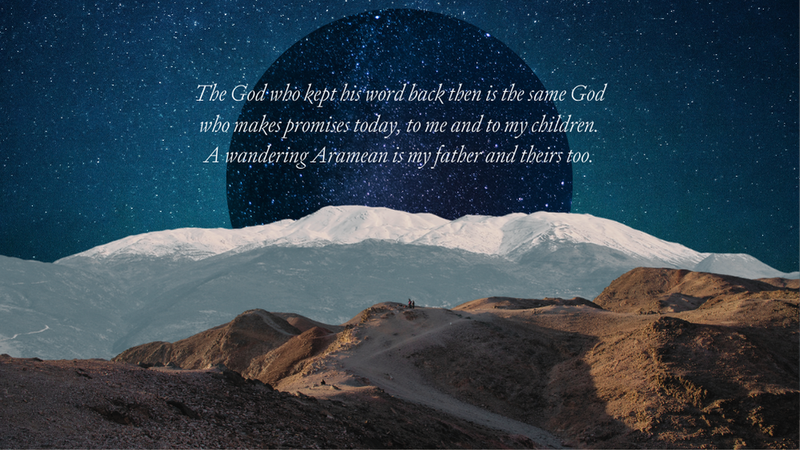Rev. Jared L. Jones is rector at Holy Cross Episcopal Church in Sanford, Florida, in the diocese of White Horse Inn co-host Justin Holcomb. I’ve gotten to know Jared over the past year and a half, during which he’s written multiple pieces for MR (one co-written with Holcomb). We’ve begun working with Jared on exciting plans to host a conference together in early 2025.
In the Great Commission (Matt. 28:18–19), Jesus draws an intimate connection between making disciples and baptizing. Many of us think of baptism as the entrance into discipleship. As an Anglican, how do you relate the Bible’s teaching about discipleship, and the Christian experience of being a disciple of Jesus, to baptism?
The covenant sign was a sign God gave to Israel not just for entering his covenant but for learning how to live according to the promises he gave Abraham beginning all the way back in Genesis 12: “I will be your God, you will be my people, and through you all the nations of the world will be blessed. And here’s the covenant sign [circumcision] I’m giving to you so that you will always be able to remember this promise.” So, from the old covenant to the new, there’s a through line correlating circumcision with baptism as the sign of the covenant, along with a call to disciple those who receive the promises—from infants to adults—in how they must take that covenant on for themselves. If baptism is the beginning of the Christian life, then it should characterize our whole life. Baptism isn’t about you and me improving ourselves or working ourselves to a place where we can accomplish something. It’s you and me learning how to live according to a promise—to live resting on a promise that’s been freely given to us, just as God’s people have always done.
As you describe baptism as an entrance into discipleship that characterizes the whole of the life of a disciple, I can’t help but think of Deuteronomy 6. Verse 4 is the famous creed of the Old Testament: “Hear, O Israel, the Lord our God, the Lord is one.” Then comes the call to follow him and train up the coming generation in the faith: “You shall love the Lord your God with all your heart and with all your soul and with all your might. And these words that I command you today shall be on your heart. You shall teach them diligently to your children, and shall talk of them when you sit in your house, and when you walk by the way, and when you lie down, and when you rise,” and so on (vv. 6–9, 20–25).
Yes, and the Christian life is no different. Everything we do is built on a promise that God has given us. And where does he give me that promise? Is it just out there somewhere, abstractly available to everyone? If so, then how do I know he really promised me? Maybe the promise was good for my parents or for my friend or pastor, but how do I know it’s really for me? How do I assure my children that God’s promise is for them—directly by name? Baptism, as it’s been said, is putting the word into water and then putting that water onto someone. It’s wording a Christian into existence, right?
One of my favorite parts of my tradition’s liturgy for baptizing an infant comes right after we baptize the child in the name of the Father, Son, and Holy Spirit. It's when we take oil and place the sign of the cross on the child’s forehead and pronounce the child’s name. For example, we’ll say, “Jared, you are sealed by the Holy Spirit in baptism and marked as Christ’s own forever.” To me, this is a promise that God has claimed this child. And if my children belong to God, then I’m going to raise them to know that they belong to God. I’m going to teach my children what it means to belong to God, and if they stray, then I’m going to remind them as a church—and as a pastor and a father—that they need to repent and return, because they’ve been chosen by God in baptism. It’s all rooted in the word of promise God has given.
What is baptism’s day-to-day significance for people in your congregation?
Just like any promise, sometimes it doesn’t come to mind until you need it! When I’m doing a wedding, I always say that the vows the couple are taking aren’t so much for the “richer” and the “in health” and the other “better” times. You don’t generally need vows when things are going well. You need vows for “in sickness” and “poorer” and sin and all the other “worse” times. That’s when I must lean on the fact that I made a promise and that my spouse made a promise to me. I think baptism is the same thing. We don’t lean on it much until we really need it. Part of maturing as a Christian is realizing how often we do need it. Once you really start running into sin (your own and others’) or you feel like God has let you down or abandoned you, baptism becomes this bedrock, like a wedding ring. I’m allowed to pray boldly like the psalmists, “God, if you abandon me, you will be unfaithful to the promises you’ve made. God, if you abandon my child, you will be unfaithful to the promises you’ve made. So don’t do it, because you’re not unfaithful. You don’t lie. In my baptism, you swore that I belong to you.”
As a kid baptized at twelve in a Southern Baptist church, I remember it sounding odd the first few times I came across some famous Reformation writer encouraging those struggling with assurance to “remember your baptism.” All the people they were talking to were baptized as infants. How could they possibly remember it? I eventually realized that the strength of or even awareness of my faith should never be the ground of my assurance. Whether baptized as an infant or not, the ground of my assurance is that God claimed me in baptism; God is the one who baptized me. “Remember your baptism” really means “Remember that God remembers you.”
One of the people often used as an example of why baptism in and of itself doesn’t save you is the thief on the cross. Although he was never baptized, the thief’s prayer—“Jesus, remember me!”—is the cry of the baptized. I think that the whole Christian life begins with a promise and that most of the activity of the Christian life is really preparing ourselves to die with that promise. Christians live prepared to die within the covenant.
This sounds like the old saying, “Christianity is the art of dying well.” Or to put it in terms of what you’re getting at, being a disciple of Jesus is the art of preparing to die well.
We’re so disconnected from death and don’t think about it often. But death is a terrifying thing. If we really stop and think about the idea that everything that we are, everything that we think, everything that we’ve built, all of our identity—we have to let it all go. That can be a horrifying experience. Because in order to let all that go, you have to trust that something is going to be on the other side, that something about you matters more than all your activity and work and everything else you try to hold on to. It’s no small thing to try to live in preparation for actually dying as a Christian in comfort and peace, even joy. That kind of preparation takes effort, and I don’t mean to say that going to heaven is contingent on dying well. There are a lot of people who will wake up in bliss in the presence of the Lord after screaming the whole way there. And yet God is faithful to the promises that he made and that they trusted. But the work we do is really, I think, a work of how to begin to die every day, to where the final door you walk through is not as scary as it might be.
Often when we think about the Christian life, we imagine it consists in our explicitly spiritual or ministry-oriented activities. But maybe most of the Christian life is just what Paul describes in 1 Thessalonians: We should seek to live a quiet life, minding our business, and working with our hands (4:11). That’s a realistic vision of Christian discipleship, because sometimes the best thing you can do in life is just to get through it. Life is hard. Christian perseverance isn’t about achieving something big or conquering the world in the way we think that should look. According to the book of Revelation, conquering the world really means to remain faithful through a life that tries to pull you away from Jesus every chance it gets (2:25–26).
To me, these truths give an order for what church discipleship should look like. It’s not getting everybody onto a discipleship track with small groups and this or that program. Not that any of those things are bad, but the church should be focused on being there for the major life stages from birth to death. We’re there to prepare Christians to live and die, to help one another know the significance of our lives.
Nowadays, we’re so obsessed with identity. We’re constantly encouraged or tempted (or flogged) into creating our own identity, and then recreating it once we get tired of it or we think we might not have gotten it right. But God forms our identity through ordinary word and water and bread and wine. What’s more salient to my identity than birth and death? This reminds me of Paul’s connection between death, life, and baptism: “Do you not know that all of us who have been baptized into Christ Jesus were baptized into his death? We were buried therefore with him by baptism into death in order that just as Christ was raised from the dead by the glory of the Father, we too might walk in newness of life” (Rom. 6:3–4). Just as life consists in being born and dying, so baptism consists in dying with Jesus and being born again to undying life with him.
Baptism is basically a summary of a child’s whole life. It’s a recognition that this child is going to die someday, yes, but we’re claiming that on the front end. Christ has already died the death we’re going to die, and we’ll be given the life he has won for himself. In between, our whole life is the story of how God’s grace and promise given in baptism gets worked out in our actual lived experience.
Discipleship is about us learning to take on an identity that’s given to us in our baptism. In Deuteronomy 26, Moses teaches the Israelites how to think about their identity after they take possession of the Promised Land as their inheritance. Whenever they offer the firstfruits of their harvest to the Lord, they must recite a little summary of the story of redemption to the priest: “And you shall make response before the Lord your God, ‘A wandering Aramean was my father. And he went down into Egypt and sojourned there, few in number, and there he became a nation, great, mighty, and populous. And the Egyptians treated us harshly and humiliated us and laid on us hard labor. Then we cried to the Lord’” (vv. 5–7). Now, did the Egyptians mistreat the particular individuals God is teaching to recite this story? No, the patriarchs had died many hundreds of years earlier. God is teaching his covenant people to take the identity of the patriarchs as their own. We were treated harshly and humiliated in slavery. We cried to the Lord, the God of our fathers, and he delivered us in great mercy and power. He did it for me. Because the God who kept his word back then is the same God who makes promises today, to me and to my children. A wandering Aramean is my father and theirs too.
My kids were each baptized in different states (one in a different country), in different churches, different denominations. That’s part of the truth. But the deeper truth is that all of them were baptized into Jesus and all of us were baptized into each other.
God gives this promise to his covenant people, but we also adopt it and trust it as our own. One thing I love about our prayer book is that, at a child’s baptism, the parents take the baptismal vows on behalf of the child. We’re the guarantors of these vows. Later, in the confirmation process as a child matures, he or she is catechized and learns the faith. Then the child goes before the bishop as a representative of the church and personally takes on those vows. But they’re the same vows, which the parents are in a very real sense handing over to the child as their covenant identity.
I think all our confessional traditions would wholeheartedly embrace the good news that God’s promises are for our children, and so we call them to embrace the heritage that God is giving them.
That’s right. And because of his grace and faithfulness, we trust that God will woo the hearts of our children to fall in love with his gospel. Even through their sin, messiness, and trials, he’ll speak tenderly and whisper to them that he loves them and will call them to faith. Just as he does with us.
And that’s how we remember our baptism.







